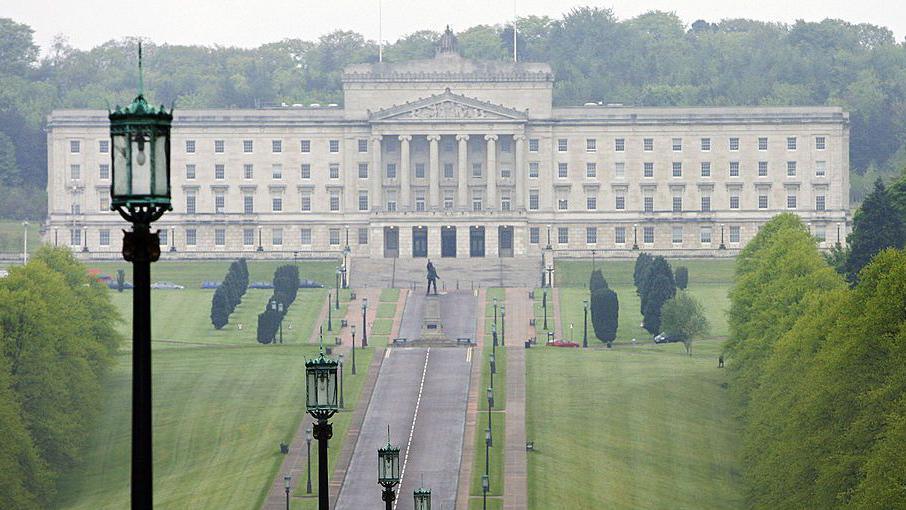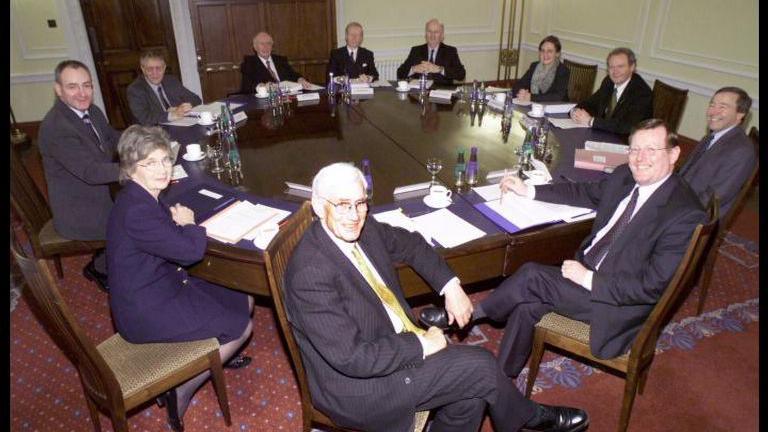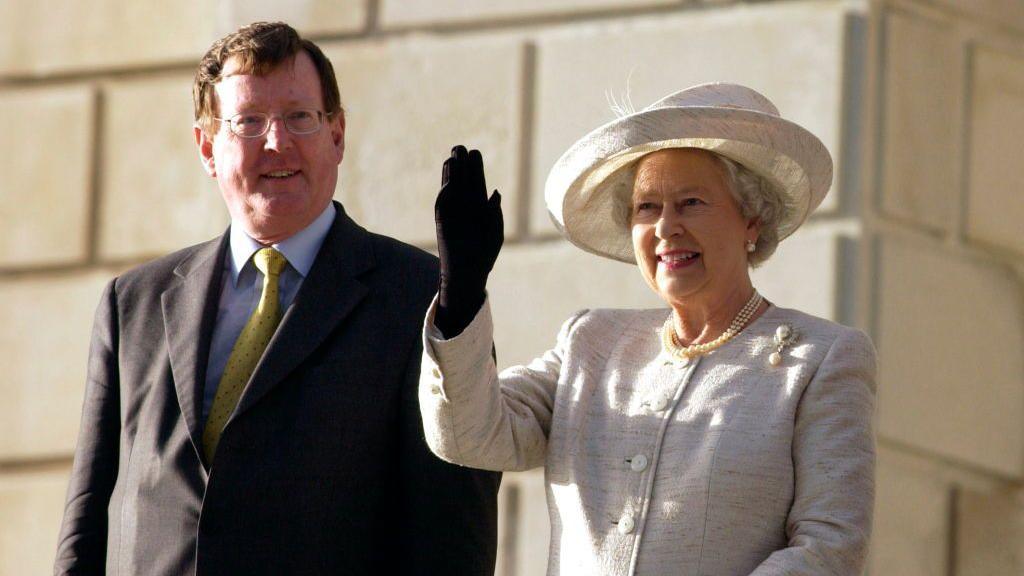Stormont stalemate 'only expected for a short time'

Mist surrounds Stormont in May 2006 as the Northern Ireland Assembly meet for the first time since 2002
- Published
A lengthy return to direct rule from London was not envisaged when devolution was suspended in October 2002, files from the Public Record of Northern Ireland (Proni) have revealed.
Power-sharing institutions were suspended after allegations of a republican spy ring at Stormont, which created tensions between the main political parties.
Dr Andrew McCormick, of the Northern Ireland Department of Finance and Personnel, hoped the principles governing his department's relationship with the Treasury while devolution was suspended would "only apply for a short time".
He added that "we will soon revert to the arrangements that apply under devolution".
Direct rule lasted until May 2007.
Refusal to attend

Northern Ireland's first power-sharing executive held its first meeting on 2 December 1999, but without its DUP ministers
The minutes of the first meeting of the new Northern Ireland Executive which was established under the Good Friday Agreement have also been released.
Despite the agreement being signed in April 1998, the executive did not meet until 2 December 1999 due to Ulster Unionist Party (UUP) concerns at the lack of progress on IRA decommissioning.
The two Democratic Unionist Party (DUP) ministers - Nigel Dodds in Social Development and Peter Robinson in Regional Development - refused to attend meetings.
The minutes show that it was agreed they would still "receive papers for, and minutes of, executive committee meetings".
This was reversed in June 2000 when it was decided that "pending the receipt of satisfactory assurances from DUP ministers regarding the confidentiality and integrity of executive committee business", they would no longer receive such documents "as of right".
'Breach of the ministerial code'
The minutes of the meeting held on 13 September 2001 reveal the executive "held a minute's silence as a mark of respect to the victims of the terrorist atrocities carried out in the United States of America", two days previously.
Sir Reg Empey, the interim first minister following David Trimble's resignation in June 2001, and Seamus Mallon, the Social Democratic and Labour Party deputy first minister, wrote "on behalf of the executive to President Bush expressing sympathy".
Party political tensions within the executive are revealed in a discussion from 19 March 2002 when the minster for education, Sinn Féin's Martin McGuinness, "expressed his concern," that a speech by Trimble at the UUP AGM was "in breach of the ministerial code".
The specific comments to which McGuinness objected are not repeated in the minutes but may be the first minister's reported description of the Republic of Ireland as "a pathetic, sectarian and monocultural state".
The executive's discussion of the controversy ended with an agreement that "the ministerial code should be the subject of discussion at a future executive meeting".
Police recruitment
The suspension of devolution on 14 October 2002 resulted in civil servants deputising for ministers at a Police Service of Northern Ireland (PSNI) human rights conference held in Belfast on 21 and 22 October.
The recruitment of ethnic minorities into the new police service was a central topic of discussion at the conference.
The PSNI's Joe Stewart noted that the Patten report which "places ethnic minorities in the category of 'Protestants and others'... does not assist the process of recruitment" from ethnic minorities.
This categorisation meant that the 50/50 recruitment policy, aimed at attracting more Catholics into the police, potentially disadvantaged ethnic minority applicants.
"With 65% of applications coming from 'Protestants and others', "this increases competition within this grouping and makes the candidates less likely to be successful," Stewart said.
"Conversely, it was argued that a disproportionately high recruitment of ethnic minorities could give rise to claims of unfair discrimination in their favour: "ironically, the higher the percentage population of ethnic minorities, the stronger would be the claim for disadvantage.
"This would decrease further the chances of those who were neither Catholic, nor from an ethnic minority background, of competing successfully for the 50% non-Catholic allocation."
Further discussion of the origins of the 50/50 recruitment policy reveals that "consideration was given to including women on a 50/50 basis but legal advice at that time was that this was not viable despite their severe under-representation in the police force".
Elizabeth II's Golden Jubilee

Queen Elizabeth II with the late David Trimble at Stormont in May 2022
Elizabeth II's Golden Jubilee was also in 2002 and planning was started by the UK's Department of Education and Employment (DfEE) in January 2001.
The Northern Ireland Civil Service discussed whether Stormont's Department of Education would be involved or whether "given our rather unique circumstances in Northern Ireland, we should leave DfEE to get on with it".
The observation that "there is … some difficulty in the devolved environment with the Department of Education taking the initiative" likely refers to the education portfolio being held by Sinn Féin's Martin McGuinness.
In this context it was thought that "the Department of Culture, Arts and Leisure [DCAL] might be well placed to take the lead in the co-ordination of the Jubilee celebrations".
DCAL's minister was the UUP's Michael McGimpsey.
There were concerns that the relevant officials in Northern Ireland were not being kept fully informed of the jubilee plans because of confusion over how devolution operated.
"The possibility that GB officials are not distinguishing between the NIE [Northern Ireland Executive] and the NIO [Northern Ireland Office] cannot be overlooked".
The Queen's expressed desire that celebrations incur "no undue cost" was a convenient cover for the executive not to undertake any "high-profile major initiative", but rather to rely on "locally inspired events and co-ordinate UK-wide events within Northern Ireland".
Although Elizabeth II visited Northern Ireland in May 2002, the hopes of members of the Northern Ireland branch of the Civil Service Retirement Fellowship that they would have an opportunity to present the late queen with a leather-bound Book of Congratulations including "hand-written greetings from … retired civil servants" were dashed.
It was thought "unlikely that a suitable opportunity will arise" for such a presentation to be made.